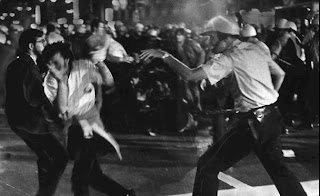Special to The Times
 As the Democratic National Convention approaches, the one held 40 years ago in Chicago offers an insight into how the next election might turn out.
As the Democratic National Convention approaches, the one held 40 years ago in Chicago offers an insight into how the next election might turn out.In 1968, the United States was embroiled in the unpopular Vietnam War, with hundreds of thousands of protesters marching in the streets. Today, the U.S. is stuck in the unpopular war in Iraq.
Although the number of protest marches is down, opinion polls show greater discontent with this war. It was not until after the 1968 election that a Gallup Poll revealed a slight majority of Americans favoring a withdrawal from Vietnam. Today, before the party's nominating conventions, three in five Americans (61 percent) think U.S. forces should get out of Iraq within a year.
Nevertheless, unlike the thousands of protesters battling police outside the Democrats' '68 national convention, there will be no mass protests at either party's convention, despite an ongoing war and an unpopular incumbent president.
There will be none for three obvious reasons. There is no draft and therefore college students, who formed the backbone of the Vietnam protests, do not have to think about trudging in a swampy jungle after trampling the trimmed lawns of their campuses. The number of soldiers in Iraq is a third of what we had deployed in Vietnam — 160,000 versus 500,000 — and that includes the latest "surge" of troops. Finally, this war's "embedded" media in our military limits opportunities to beam home images of civilian carnage and, thus, there is less anger and shock than accompanied the gritty Vietnam War photos from more independent journalists.
But, most important, there is another reason: cynicism has not corrupted our spirit. In '68, there was a growing sense of cynicism, best expressed by the growing baby-boomer population, that fed the nation's anger and discouragement with politics. At the June 1968 national convention of the Students for a Democratic Society, the largest student organization to ever exist in the U.S., the predominant attitude was that the upcoming election was a fraud that would only foster the illusion of democracy. There was little hope that electoral politics could end the war.
The chance for hope was dashed when Democratic presidential candidate Robert Kennedy was assassinated a week before the SDS meeting. He was on the way to winning over the doubtful; even anti-war folk singer Phil Ochs, known for his cynical ballad "Love me, I'm a Liberal," was a Bobby Kennedy fan.
Today, that sense of hope is being expressed most visibly through the younger generation embracing another relatively neophyte politician, Sen. Barack Obama, to the chagrin of Sen. Hillary Rodham Clinton, who is as respectable a legislator as Sen. Hubert Humphrey was in '68.
Both Clinton and Humphrey have legislative track records that are significant and progressive. But fate dealt each a hand with an ace of spades, that killer card that portends doom despite its apparent value. In both of their cases, it's an ex- or soon-to-be-ex-president.
Humphrey, who was the strongest critic of the Vietnam War inside the Lyndon Johnson administration, had to keep his saber in his sheath during the campaign so as not to wound his commander-in-chief, who had chosen not to run for re-election. Clinton has to keep reminding everyone that she is not another Bill Clinton; she is truly a progressive in her own right.
Similar to Humphrey, she has a dominant ex-president as her closest and most public ally. And, in her eagerness for the ex-president's crown, she has muted her own potential for inspiring change in the way things are done in the nation's capital, as Humphrey did.
A replay of Humphrey's valiant but ultimate failure at the polls should cause a Democrat's heart to skip a beat. The question that many Democrats are asking themselves is, which ship can make it to shore this time?
The crowds, and their enthusiasm, point the way. Hope is what wins elections, not résumés, no matter how long or meritorious. Hope is what drives the voters to the polls. It's what keeps the weeds of cynicism from strangling democracy's flowers. It is why there will be no repeat of the '68 convention's roiling, mass demonstrations.
And, it is why the nominee who can capture the spirit of that hope will reach the shore next fall.
Nick Licata is a member of the Seattle City Council and a former chapter president of Students for a Democratic Society at Bowling Green State University.

